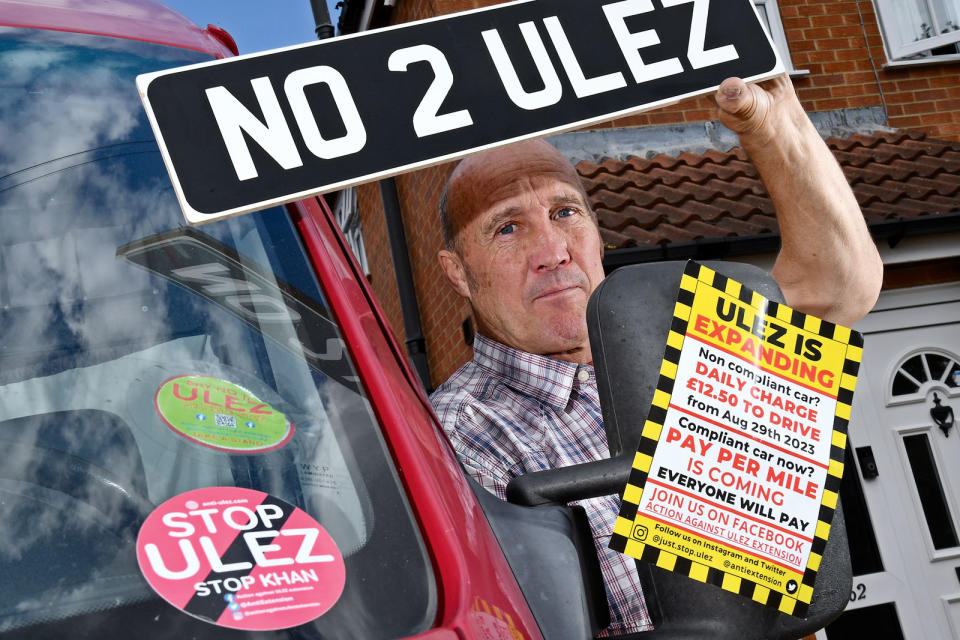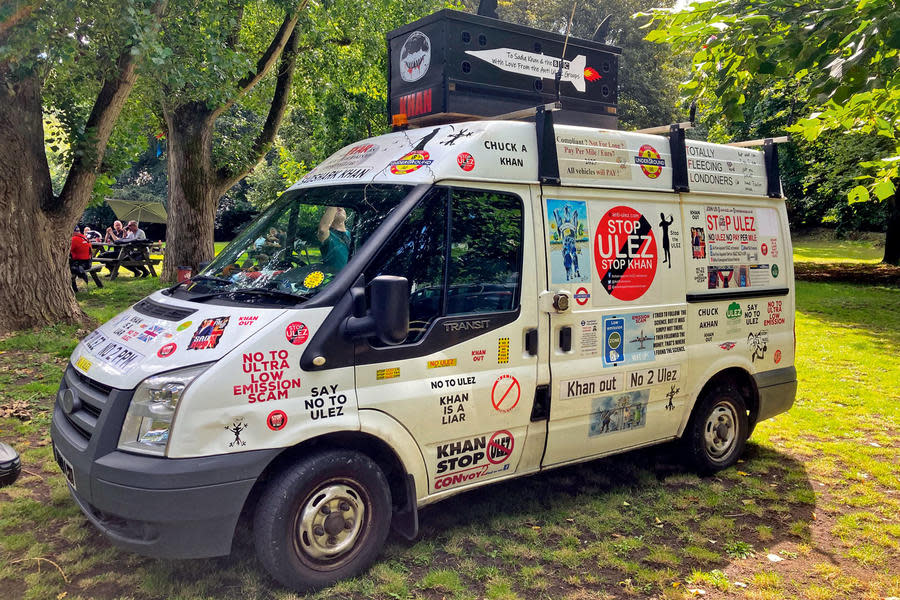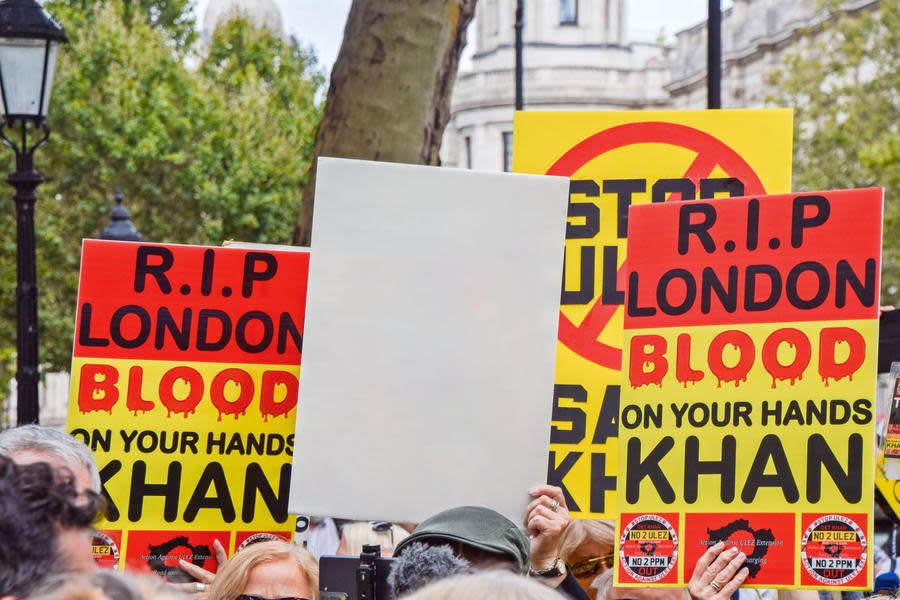Meet 'Risky' Phil, the UK's leading anti-ULEZ campaigner

They call him the cat herder – the person who brings together people heading off in different directions but who fundamentally share the same aim.
And in the days leading up to the Ultra Low Emission Zone (ULEZ) expanding to cover all of Greater London, Phil Elliott was doing a lot of herding.
The founder of UK Unites, a 3000-member campaign group that aims to “unite as many people across the UK to stand up against unjust, undemocratic and unnecessary political interference”, was talking to me at his home in Lincolnshire, fresh from organising a major protest against the ULEZ expansion.
I had first met Elliott a few days before at Rykas cafe, near Dorking, Surrey. It’s popular with bikers and I had ridden there to enjoy a coffee while admiring the machinery.
To my amazement, instead of the usual clusters of bikers, there were hundreds of them gathered in front of an old London bus. I quickly saw why. On its side, banners and signs read: ‘Stop ULEZ’, ‘Stop Khan’, ‘No 2 ULEZ’, ‘Our Roads, Our Freedom’.
Arranged around the bike park, I counted 12 vans covered in such political slogans. One of them had a coffin on its roof bearing the name ‘Khan’. On one side of it was an image of a missile bearing the message: ‘To Sadiq Khan and the BBC, with love from the anti-ULEZ groups’.
A group at the rear of the bus addressed the crowd. It included Howard Cox, Reform UK’s candidate for London mayor, who, to roars of approval, assured the assembled bikers that he would make London “the most motorcycle-friendly city in the world”; and Lembit Öpik, former Liberal Democrat MP and now spokesman for the Motorcycle Action Group, who stoked the crowd further with an attack on Khan and the ULEZ expansion.
“It could come down to the thousands of us here to stop him,” he said, and – aware that bikes must satisfy at least Euro 3 emissions regulations, in force from 2007, or face a £12.50 charge for entering London – the crowd again roared its approval. (Petrol cars must satisfy at least Euro 4, in force since 2005, and diesel cars Euro 6, in force since 2015.)

After the speeches, Cox seized the microphone to thank a chap standing alongside him in a hi-vis vest, saying: “Now give a big thanks to Risky Phil, who organised today’s meeting and the others leading up to it elsewhere around the M25.”
The subject of the congratulations urged everyone present to “keep up the good fight” before stepping off the bus and melting into the crowd.
I recognised him as one of the guys who had earlier waved me into the car park. Aspiring mayors and former parliamentarians aside, was Risky Phil the real power behind the anti-ULEZ campaign and others fought on behalf of disgruntled drivers and bikers down the years?
I had to know, which is how, a few days later, I found myself at Elliott’s home. I was keen to hear his story, but first I wanted to know why, living so far from London, he was so worked up about the ULEZ.

“Because people who live here and whose cars don’t meet the ULEZ regs but who have driven down to London on business or to see friends and family have told me that, before the scheme even goes live, they’ve received letters from Transport for London [TfL] warning them that it’s happening and that if they enter the zone when it has been expanded, they will be charged,” he explained.
“It’s outrageous that TfL is tracking people and wasting taxpayers’ money writing to them.”
Later, a TfL spokesperson confirmed that between February and July, the organisation sent more than one million warning letters to motorists its cameras saw driving non-compliant cars in Greater London. However, they wouldn’t reveal at what cost, on the grounds that the information was “commercially sensitive” to the DVLA, which posted them.
Elliott’s crusade against politicians who he believes are interfering with his and others’ lives goes back to 2008, when London’s Low Emission Zone was implemented to clean up diesel-powered commercial vehicles.
“I was living in London and running a truck-recovery business,” he explained. “The new regulations threatened my work. I tried to fight back, but nobody was listening and my business eventually folded, because I couldn’t afford to upgrade my truck.”

This experience left Elliott determined to push back on further incursions into people’s lives and livelihoods by what he described as, to put it politely, meddlesome politicians, but it was the expansion of the ULEZ and the threat of pay per mile as a replacement for vehicle excise duty and/or fuel duty that got him (and others) really rattled.
On the condition that I wouldn’t name names, he showed me the list of people with whom he shares a WhatsApp group – mainly popular social media figures and campaigners from motoring and related fields, plus a few politicians.
Its purpose seemed to be to share information and ideas. Nothing about it was extreme, although some members did have a whiff of the conspiracy theorist about them.
This is an aspect of Elliott’s argument that can become a little wearing, but he makes no apologies.
“The difference between the conspiracy theory and the reality is six months. One always follows the other,” he said. “The ULEZ is a money-raising exercise. You think they will stop once they've cleared the roads of older cars? They will just raise the bar so that petrol cars must be at least Euro 5 and diesels Euro 7.”

Elliott is intelligent, articulate, a natural organiser (“I get people together and find where they share common ground”) and sensitive, too.
For example, he recounted the story of a father with a disabled son who changed his non-compliant van for a newer one that he thought was compliant but proved not to be. “The new van has dropped in value, leaving him with a big debt,” said Elliott, genuinely concerned.
Hadn’t his protesting all been a waste of time, though? The ULEZ expansion was happening and even the RAC had advised those London councils that were resisting erecting ULEZ signs to “give in” so drivers could be given sufficient warning.
“Not at all,” insisted Elliott. “Khan won’t be mayor forever, and what I call the Titanic moment – that bit in the film when the captain realised his ship wasn’t unsinkable after all – is fast approaching. Londoners and anyone entering the ULEZ are about to have their Titanic moment.”
]]>

 Yahoo Autos
Yahoo Autos 